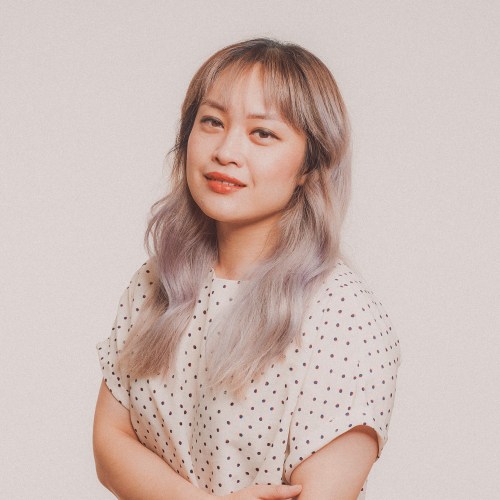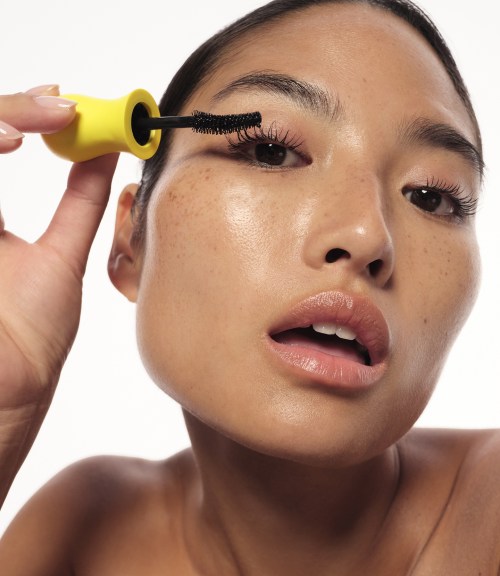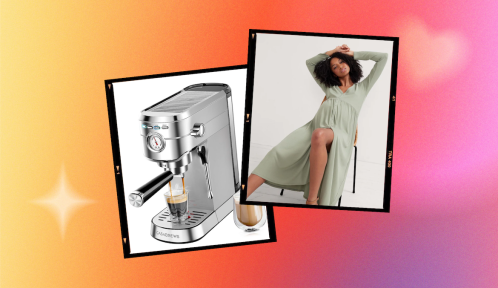If you’ve ever fallen down a beauty rabbit hole on YouTube or TikTok, chances are you’ve come across Lab Muffin. Michelle Wong, PhD—the Australian cosmetic chemist and science communicator behind the brand—has spent over a decade breaking down skincare myths, analyzing ingredient lists, and explaining the science behind everything talc makeup to gel manicures.
Unlike so many of her counterparts in the community, Wong’s content doesn’t rely on fear-mongering or flashy gimmicks. Instead, she breaks things down with the precision of a scientist and the patience of an educator, translating complex chemistry into bite-size, practical takeaways. Whether she’s fact-checking viral trends (like whether rosemary oil actually regrows hair) or calling out confusing marketing claims (“acne-safe” foundation labels, anyone?), Wong’s approach is refreshingly straightforward: Science first. Always.
It’s an approach that has since earned Lab Muffin the trust of millions—many of whom found Wong’s content after feeling overwhelmed by the sheer volume of beauty misinformation online. “A lot of people are realizing that science is how you discover what actually works,” says Wong. Some come to Lab Muffin for the science and stay for the beauty, while others come for the beauty and stay for the science. “I’m trying to marry both worlds,” she says. But in the end, they all land in the same place: learning how to navigate the beauty world with a more critical eye.
And in 2025, when health and wellness misinformation spreads faster than facts, Lab Muffin’s work is more crucial than ever. “The best way to bring people to science is to give them something they’re interested in,” says Wong. Busting beauty myths is just one part of her mission, though—Wong is also working to change the way people think about science, one ingredient at a time.
Sweet name, serious science
Historically, video has been treated as a novelty in education—fun, sure (see: Bill Nye: The Science Guy and Reading Rainbow), but not a “serious” learning tool. Fast forward to today, and platforms like YouTube, TikTok, and Substack are flooded with educational content. But with that accessibility comes a major downside: There’s no built-in quality control. Algorithms prioritize engagement over accuracy, highlighting attention-grabbing soundbites over well-researched explanations.
Beauty consumers—many still in their teens—are left to separate fact from fiction on their own, a skill most adults haven’t even mastered. It’s a large reason why Lab Muffin has become such a trusted source in the beauty space, whether people are looking for quick answers on the best Korean sunscreens (yes, Wong tested and photographed them all), or they’re interested in deep-diving into the science of red-light therapy (complete with a reference list of 27 sources). At Lab Muffin, there’s an unspoken agreement between Wong and her readers: Give me your time, and I’ll give you the truth.
When asked about her own fact-checking process, Wong describes a meticulous methodology that goes far beyond a quick PubMed search. She doesn’t just verify claims, she dissects them—cross-referencing peer-reviewed studies, tracing the origins of viral beauty myths, and investigating the sources behind the sources. “After a while, you find out that a dermatologist [for example] might be an expert on some parts of skincare, but not others,” says Wong.
“The best way to bring people to science is to give them something they’re interested in.”
Take any viral dermatologist or plastic surgeon on social media. One might specialize in acne treatments, but that doesn’t mean they can explain the precise chemistry within a product formulation like a cosmetic chemist could, or break down ingredient safety like a toxicologist would. That’s why Wong so frequently weighs in on trending conversations, not only debunking viral misinformation, but also encouraging people to investigate claims rather than take them at face value.
For Wong, this level of scrutiny isn’t excessive—it’s just how science should work. And this relentless commitment to research and accuracy is exactly what sets her apart from the average beauty content creator.
Credibility over clickbait
Wong’s commitment to rigorous fact-checking isn’t just about helping consumers make informed choices (though, yes, that’s also a huge part of Lab Muffin’s mission). For her, it’s also about something much bigger: getting people to think critically—about beauty, health, science, and the way information spreads. “I’ve realized that beauty and wellness are a gateway into conspiracy-thinking about other areas of health,” says Wong.
The past few years have made that clearer than ever. The rise of “clean” beauty and the push for “natural” products (terms that are unregulated and poorly understood) often echo the same fear-based messaging seen in anti-vaccine rhetoric—warnings about “toxins,” distrust of regulatory agencies, and the belief that “clean” is always better. It’s a slippery slope that, left unchecked, can lead people to question not just what’s in their deodorant or lipstick, but the legitimacy of modern medicine itself.
Take the recent measles outbreak: Once considered eradicated in the U.S., cases are now rising in communities with low-vaccination rates, fueled in part by the same kind of misinformation that runs rampant in the beauty and wellness industries. Wong has spent years watching these patterns emerge, noting how misleading claims about beauty ingredients often mirror the spread of medical misinformation.
The fear-mongering around certain chemicals, for example, isn’t so different from the way people misinterpret vaccines. People often fixate on scary-sounding names (think: parabens, sulfates, aluminum) rather than the actual evidence-based risk of those ingredients. Equally concerning, says Wong, is how deeply these fears take root—and how far they can extend.
“If someone believes aluminum is too scary to put on their armpits [via deodorant], it’s going to be so much harder to convince them to inject it into their baby [as part of a vaccine],” says Wong. It’s a pattern she’s seen play out time and again, and now, it's officially personal: “Clean beauty is kind of like my superhero origin story—or my villain origin story.”
But let’s be clear: Wong isn’t here to yell at anyone for their beliefs. That’s not Lab Muffin’s style. And more importantly, she knows it’s ineffective. Instead, Wong has spent her career proving that engaging with people—not shutting them down—is the best way to influence change.
A formula for success
For Wong, this realization first took shape in 2011, midway through her PhD in organic chemistry. As she explored online discussions about contentious health topics—like anti-vaccine rhetoric—she noticed a stark divide in how scientists approached misinformation. Many dismissed skeptics outright, assuming facts (and a bit of berating) would win people over. “Back then, a lot of [the attitude] was, ‘Science is great, everything’s got chemicals anyways, and if you don’t like vaccines, you’re an idiot,’” Wong recalls.
But in certain corners of the internet, she witnessed a different approach: scientists who took the time to understand people’s concerns before carefully dismantling misinformation. They weren’t just stating facts; they were “arguing against the arguments,” says Wong—a tactic she found far more effective in actually changing belief systems.
Outside of the lab, Wong was also diving deep into the world of beauty. “I was in a bunch of nail-polish groups on Facebook, and people knew I was working on a chemistry PhD,” she says. “[They’d ask], ‘Are these formulas actually bad for me? Do I really need to avoid certain chemicals?’” Today, these questions are relatively easy to answer with a quick Google search. But a decade ago, misinformation was the norm, and it was difficult for the average person to find credible (and digestible) information on specific beauty topics.
“I want to democratize the education I’ve had the privilege of having."
Recognizing the need for reliable resources in the beauty space, Wong started a blog to share the same fact-based answers she had been giving on Facebook. “I spent six months trying to think of a name for [the blog] and was like, ‘Well, if I don’t start now, I’ll never start,’” she says. At the time, she was sitting in a lab, and the nickname Wong’s boyfriend had given her was “muffin,” so she stuck the two together. With that, Lab Muffin was born, standing out as a friendly and approachable beauty guide in a sea of clinical, male-dominated chemistry accounts.
Though evidence-backed beauty might feel commonplace today, it was pretty revolutionary during a time when science was even more patriarchal than it is now. Even in 2025, beauty science is often seen as a “lesser” field, says Wong, despite its direct ties to chemistry and biology. Almost everyone interacts with beauty in some way each day, she notes, whether or not they actively care about it. “Even the most basic man likely uses shower gel, hand wash, or sunscreen,” says Wong.
The future of Lab Muffin
These days, Wong’s fanbase bridges generational gaps and spans continents. Thanks to her background in science and her keen eye for social media trends, Lab Muffin has grown from a simple 2010s blog into a multi-platform powerhouse, amassing millions of devoted followers across YouTube, TikTok, Instagram, and Nebula, while also publishing a well-received book, The Science of Beauty, in 2024.
But Wong isn’t just focused on myth-busting in the present—she’s thinking about the future of science communication itself. The internet is noisier than ever, and the rise of AI-generated content and influencer-driven misinformation means the need for trusted voices is only growing. Never content to sit still (remember, this is a full-time content creator who also decided to sew her own wedding dress in the middle of authoring her debut book), Wong already has her next big goal in sight: helping the next generation of science communicators.
In partnership with fellow scientist Jen Novakovich of The Eco Well, Wong co-founded Beauty SciComm, a social enterprise dedicated to giving beauty science a head start against misinformation. “We want to mentor people through growing their platforms, balancing [content creation] with their work, and finding good sources to use,” says Wong. The initiative also serves as a media center, helping journalists and content creators connect with relevant experts for trending beauty stories.
Despite all of her success, Wong remains deeply committed to education beyond content creation. While many digital creators pivot to full-time influencing, Wong still teaches a weekly chemistry class at a tutoring college—a direct link to the academic world that shaped her. “I want to democratize the education that I’ve had the privilege to have,” she says. It’s a principle that continues to guide her work, ensuring Lab Muffin remains much more than “just another” beauty brand. And now, more than ever, we all need science we can trust.
Sign Up for Our Daily Newsletter
Get all the latest in wellness, trends, food, fitness, beauty, and more delivered right to your inbox.
Got it, you've been added to our email list.











